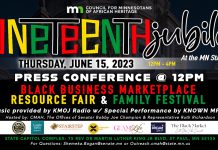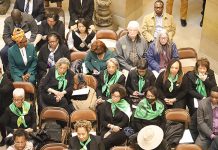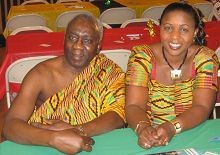
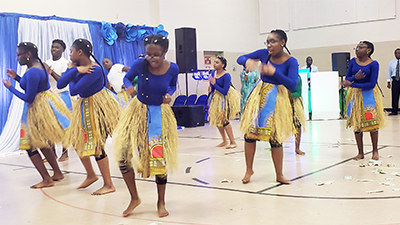
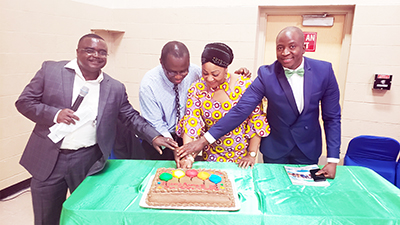
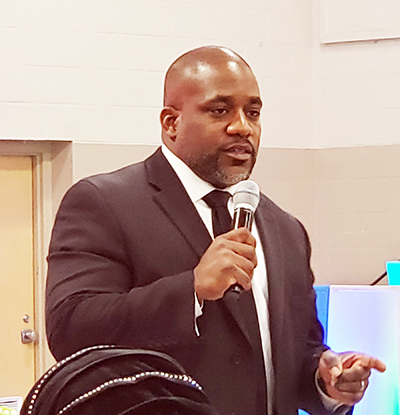
Minnesotans of African Heritage
was the keynote speaker at the
58th Sierra Leone Independence
Day celebration in Minnesota on
April 27, 2019. Photo: Tom Gitaa/Mshale
The head of the Council for Minnesotans of African Heritage, Justin Terrell, sounded the alarm on Saturday about the lack of civic engagement by the African immigrant community. Repeating a common refrain “if you are not at the table you are on the menu,” Terrell sent out an urgent appeal for the growing African immigrant community to be engaged in the process “as people are making decisions that affect your life.”
Terrell made the remarks when he keynoted the 58th Independence Day celebration of Sierra Leone organized by the Sierra Leone Association of Minnesota at the National Guard Armory in Cottage Grove.
“Does anyone know who represents you at the State Capitol?” he asked as only five hands out of the 200-plus people raised their hands.
Terrell said more people should pay attention to who is representing them in local governments, and what policies, practices and values they are really representing. He said legislators tend to listen to those who show up and ask for something.
The Council for Minnesotans of African Heritage (CMAH) is the successor to Council on Black Minnesotans as of 2015. The Council on Black Minnesotans was created in 1980 by the Minnesota legislature to advise the governor and the legislature on issues facing the state’s black community. In 2015, the legislature adopted a new statute that renamed the Council on Black Minnesotans as Council for Minnesotans of African Heritage (CMAH) an its executive director is appointed by the Legislative Coordinating Commission, a group of 12 legislative leaders that consists of six members each from the Minnesota House and Minnesota Senate.
The statute adopted in 2015 requires the governor to appoint 11 members to the CMAH requiring five of the 11 members to be women and at least three of those 11 to be “first or second generation African immigrants, who generally reflect the demographic composition of these African immigrants, as determined by the state demographer.”
“We have to learn from our past, knowing that the way things are, is not an accident,” Terrell said. The CMAH head said Minnesota has the worst disparities between the races in the nation and it will take the active involvement of all people of African heritage (African American, Caribbean, African immigrants and many others) to bring about the required change in Minnesota.
“Do you know that we only have six black elected legislators at the Minnesota Capitol out of 201 legislators?” Terrell asked. He said it is unconscionable that blacks only have a median income of $34,000 in a high-income state in Minnesota, calling it unsustainable.
He urged those present to familiarize themselves with the legislative agenda of his Council. The Council was active in support of the recently extended Deferred Enforcement of Deportation (DED) for Liberians as well as the recently passed Driver’s License for All.
Despite Terrell’s sobering message to those present for the independence celebration, a festive mood still prevailed that was a showcase of cultural foods and traditional dances from the youth. The Sierra Leone Association of Minnesota board president Dr. Jonathan Rose summed up the evening as a success attributing the success to the future the youth had displayed as possible. Also on hand were staff from the Minnesota Department of Health who presented the latest insight into malaria and how to prepare when traveling to Africa or after visiting.
Adding to the success of the 58th independence celebration was a health and wellness resource fair held the previous evening by the Sierra Leone Nurses Association of Minnesota. This year’s fair featured blood pressure and other health screening including discussions on chronic disease management.
About Tom Gitaa Gitaa, Editor-in-Chief
Born and raised in Kenya's coastal city of Mombasa, Tom is the Founder, Editor-in-Chief and Publisher of Mshale which has been reporting on the news and culture of African immigrants in the United States since 1995. He has a BA in Business from Metro State University and a Public Leadership Credential from Harvard’s Kennedy School of Government. He was the original host of Talking Drum, the signature current affairs show on the African Broadcasting Network (ABN-America), which was available nationwide in the United States via the Dish Network satellite service. On the show, he interviewed Nobel laureates such as 2004 Nobel Peace prize winner, Professor Wangari Maathai, the first woman from Africa to win the peace prize and heads of states. Tom has served and chaired various boards including Global Minnesota (formerly Minnesota International Center), the sixth largest World Affairs Council in the United States. He has previously served as the first Black President of the Board of Directors at Books for Africa. He also serves on the boards of New Vision Foundation and the Minnesota Multicultural Media Consortium. He has previously served two terms on the board of the United Nations Association. An avid runner, he retired from running full marathons after turning 50 and now only focuses on training for half marathons.
- Web |
- More Posts(455)



